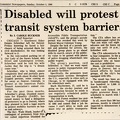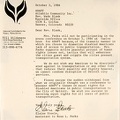THE HANDICAPPED COLORADAN
Vol. 9, No. 2, Boulder, Colorado, September 1986
PHOTO: Head and shoulders of a man (Wade Blank) with long straight hair parted in the middle, and wire-rimmed round dark glasses. He is wearing a vest over a button down shirt and undershirt and he is smiling.
Caption reads: Wade Blank. Some say he wants another Kent State.
Title: Rosa Parks leads Detroit protest march
Famous black activist ignores plea from Coleman Young to stay out
The faces and forms in the column of marchers behind her were a little different today from those she led 30 years ago, but the woman at the head of the march hasn't changed much.
Rosa Parks is 74 now and slowing down a little, but she still radiates the same spirit that helped ignite the black civil rights movement in 1956 when she refused to give up her seat to a white man and move to the back of a Montgomery, Ala., bus.
The police put her behind bars that day but within hours a local Baptist minister named Martin Luther King, ]r., orchestrated a bus boycott that was to be the first act of organized protest that would bring an end to segregation in less than 10 years.
On Sunday, Oct. 5, 1986, the issue was once again segregation and public buses, but this time there were only a handful of black faces among the marchers who took to the streets of Detroit. Yet it was just as easy today as it was in 1956 to identify what made these protestors different from other people.
They were in wheelchairs.
Rolling under the banner of the American Disabled for Accessible Public Transit (ADAPT), they had come to Detroit to picket their old nemesis, the American Public Transit Association (APTA), which was holding its annual national convention ln Detroit.
APTA represents most of the nation's public transit systems and has steadfastly refused to support—or even to-vote on—a proposal to require transit systems to add wheelchair lifts to buses.
The state of Michigan requires that all transit companies receiving state funds be wheelchair accessible, but the city of Detroit has avoided that requirement by refusing to accept any financial assistance. Buses in the largely white suburbs have lifts, but a wheelchair passenger who wants to continue a trip into Detroit is out of luck.
Detroit mayor Colernan Young, himself a black who played a prominent role in the civil rights movement in the 1960s, does not support accessibility for disabled persons and was scheduled to address the APTA convention along with Ed Bradley, also a black and a CBS newsman and regular on "60 Minutes.”
Both Young and Bradley reportedly pleaded with Parks not to participate in the march on the APTA convention, but after a late night meeting with staff and advisors, Parks said she would not renege on her commitment. As The Handicapped Coloradan " was going to press, it was reported that Young was going to ask the Detroit city council to rescind ADAPT's parade permit.
An ADAPT spokesperson said he expected some 150 ADAPT members from across the country to be joined by at least another 100 protestors in making the march on the Westin Hotel Renaissance Center.
"l think we're on the brink of breaking this thing wide open,” said Wade Blank of Denver, who helped form ADAPT. Blank said he was hoping Parks‘ participation would help people to understand that disabled people look upon accessibility as a civil right. APTA, on the other hand, says it's a question of practicality and finances and so should be left to the discretion of the local transit provider. Geographical conditions have to be taken into consideration because lifts are difficult to operate in snow and on curved roads; according to Albert Engeiken, APTA's deputy executive director.
Blank scoffs at that position and suggests that lift technology has reached a point where they can be operated in all kinds of climatic extremes, if the transit provider is truly committed to accessibliity.
Many transit systems did order lift-equipped buses in the late 1970s when the Carter administration's Department of Transportation mandated accessibility. APTA, which acts as a lobbying and policy-making group for some 300 separate transit districts, filed a lawsuit that eventually led to a reversal of that decision.
In Denver, the Regional Transportation District (RTD) announced that it was scrapping its plans for providing mainline accessible service on the basis of that ruling and quickly found itself battling wheelchair protestors in the streets.
In falling snow and freezing temperatures, protestors blocked buses and chained themselves to railings outside the RTD offices untll the courts interceded. RTD was ordered to provide some accessible service, but the board of directors continued to resist the Idea.
However, ln 1983 the appointed RTD board was replaced by an elected body and quickly voted to commit Denver to accessibility. That same year, APTA brought its national convention to Denver.
Disabled individuals and groups who had fought for lifts in the streets of Denver united under the ADAPT banner and, with the support of Mayor Federico Pena, threw up pickets around the convention hotel and arranged to present its demand for accessibility to the convention.
No vote was taken and the issue was not brought before national conventions held ln Washington, D.C., in 1984 or in Los Angeles in 1985. ln both cities ADAPT members defied police and blocked buses. A handful were arrested in Washington and a couple of dozen in Los Angeles.
ADAPT didn't limit itself to picketing just APTA’s national convention but dogged the organization across the country, sending pickets to various regional conventions, including San Antonio and Cincinnati (see related story). Buses were blocked and more demonstrators went to jail. In some cases, confrontations with local police turned ugly.
That has led some disabled groups to break away from ADAPT and Blank’s leadership. Denver's Holistic Approaches to Independent Living (HAIL, Inc.) and its executive director Theresa Preda went to Detroit but refused to participate in some of ADAPT’s actions.
"They told me they were afraid I wasn't going to be satisfied until there was blood in the street, until someone in a wheelchair got killed,” Blank said. “They told me I was trying for another Kent State."
Blank, who founded the Atlantis Community which, like HAIL, fosters independent living, was a campus minister at Kent State University when national guardsmen fired on student demonstrators during a Vietnam war protest. Four students were killed.
Blank denied that he had any such intention, but added that ADAPT has no intention of giving up civil disobedience. “It’s the most effective weapon we've got," he said. Blank said, ADAPT would probably stop buses in Detroit. "They just received 100 new buses," he said. "Without lifts, of course."
Blank said he would not be surprised if protestors were to be arrested. Ironically, on the eve of the march the Wayne County jail was filled to capacity (1700) and prisoners were being turned away.
- Created on
- Thursday 11 July 2013
- Posted on
- Monday 31 July 2017
- Tags
- ADAPT - American Disabled for Accessible Public Transit, APTA - American Public Transit Association, APTA convention, arrested, blocking buses, bus boycott, civil rights, Denver RTD, DOT regulations, lawsuit, Los Angeles, march, Martin Luther King Jr., Mayor Coleman Young, Mayor Federico Pena, Montgomery AL, public transit, Rosa Parks, segragation, Wade Blank, Washington DC, wheelchair
- Albums
- Visits
- 4562
- Rating score
- no rate
- Rate this photo


0 comments